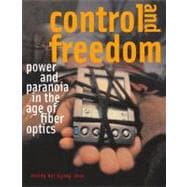
Note: Supplemental materials are not guaranteed with Rental or Used book purchases.
Purchase Benefits
Looking to rent a book? Rent Control and Freedom Power and Paranoia in the Age of Fiber Optics [ISBN: 9780262533065] for the semester, quarter, and short term or search our site for other textbooks by Chun, Wendy Hui Kyong. Renting a textbook can save you up to 90% from the cost of buying.
| Preface | p. vii |
| Acknowledgments | p. ix |
| Introduction | p. 1 |
| Interlude | p. 31 |
| Why Cyberspace? | p. 37 |
| Screening Pornography | p. 77 |
| Scenes of Empowerment | p. 129 |
| Orienting the Future | p. 171 |
| Control and Freedom | p. 247 |
| Epilogue | p. 299 |
| References | p. 303 |
| Index | p. 327 |
| Table of Contents provided by Publisher. All Rights Reserved. |
The New copy of this book will include any supplemental materials advertised. Please check the title of the book to determine if it should include any access cards, study guides, lab manuals, CDs, etc.
The Used, Rental and eBook copies of this book are not guaranteed to include any supplemental materials. Typically, only the book itself is included. This is true even if the title states it includes any access cards, study guides, lab manuals, CDs, etc.